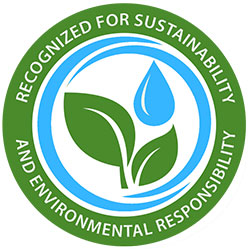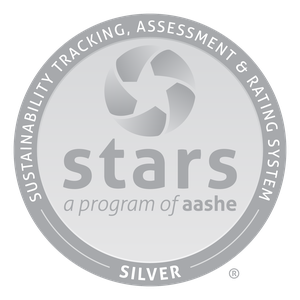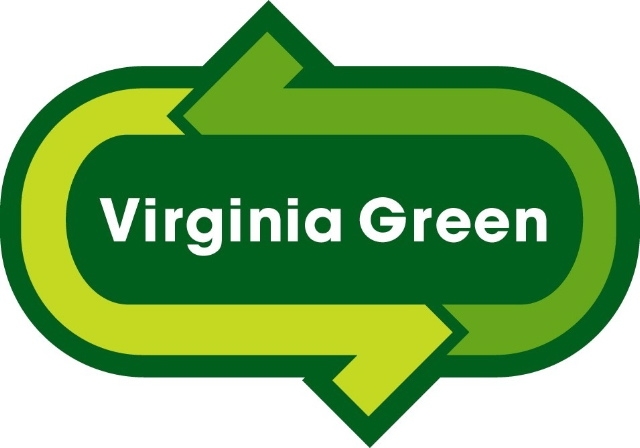Virginia Wesleyan has been recognized locally, regionally and nationally with memberships in and honors by the organizations listed below.
Princeton Review
 The Princeton Review Guide to Green Colleges
The Princeton Review Guide to Green Colleges
Virginia Wesleyan University is one of the nation's most environmentally responsible colleges, according to The Princeton Review. VWU is consistently featured in the education services company’s Guide to Green Colleges. Created in partnership with the U.S. Green Building Council and the Center for Green Schools, the guide is an online publication that profiles institutions of higher education that demonstrate a strong commitment to sustainability in their academic offerings, campus infrastructure, activities, and career preparation.
 Elizabeth River Project/Inside Business River Star Hall of Fame
Elizabeth River Project/Inside Business River Star Hall of Fame
Each year, the Elizabeth River Project and Inside Business chose one Model Level River Star Business to induct into its River Star Hall of Fame. VWU was chosen as the 2023 inductee for its sustainability efforts that reflect the University’s larger commitment to ethical conduct and social responsibility through environmental stewardship and education.
Sustained Distinguished Performance River Star Business (Elizabeth River Project)
Virginia Wesleyan was recognized as a Sustained Distinguished Performance River Star Business by the Elizabeth River Project. The River Restoration Advisory Committee, which includes River Star peers and technical experts, reviews River Star documentation every fall for entry and advancement in the program. Sustained Distinguished Performance represents completion of a significant new initiative by a River Star Business.
 AASHE STARS
AASHE STARS
Virginia Wesleyan University completed the Advancement for Sustainability in Higher Education (AASHE) Sustainability Tracking, Assessment & Rating System (STARS) reporting process and earned a STARS Silver rating in recognition of reported accomplishments in campus sustainability.
STARS is a transparent, self-reporting framework for colleges and universities to measure their sustainability performance, intended to engage and recognize the full spectrum of higher education institutions, from community colleges to research universities. The framework encompasses long-term sustainability goals for high-achieving institutions, as well as entry points of recognition for institutions that are taking first steps toward sustainability.
 Arbor Day Foundation Tree Campus Higher Education
Arbor Day Foundation Tree Campus Higher Education
VWU was honored as a Tree Campus Higher Education for 2022. Tree Campus Higher Education was founded in 2008 to provide a framework for colleges and universities to grow their community forests through five overarching standards: (1) the establishment of a campus tree advisory committee, (2) evidence of a campus tree care plan, (3) verification of the plan’s dedicated annual expenditures, (4) campus-wide observation of Arbor Day, and (5) the creation of a service-learning project aimed at engaging the student body.
 Chesapeake Bay Foundation Award
Chesapeake Bay Foundation Award
Virginia Wesleyan University is proud of its strong relationship with the Chesapeake Bay Foundation.
The Chesapeake Bay Foundation honored Virginia Wesleyan University as the Conservationist of the Year in 2018.
Read more about the award here.
Read about this recognition here.
Intentional Endowments Network
Virginia Wesleyan University maintains a relationship with this network. In a statement by President Miller from March 2020,
“The organization is reshaping institutions and communities while training the future political, business, and scientific leaders who will help solve climate change. We have developed and implemented a comprehensive Climate Action Plan and are proud to be a national leader on this important topic. Our institutional mission embraces social responsibility and participatory citizenship as essential parts of an undergraduate curriculum in the classroom, on campus, and in the community. With our commitment to the vitality of this program, we will continue to advance the cause of sustainability and environmental stewardship.”
Click here to learn more about the Intentional Endowments Network.
 Charter Signatory of Second Nature's Climate Commitment
Charter Signatory of Second Nature's Climate Commitment
In January 2016, Virginia Wesleyan College President Scott D. Miller become a charter signatory of the Climate Commitment, a carbon neutrality and climate resilience initiative created by Boston-based organization Second Nature that sets new standards for climate leadership in higher education. The Climate Commitment joins the Carbon Commitment and Resilience Commitment, together constituting the Climate Leadership Commitments. These newly integrated commitments are partially a result of the rebranding of the American College and University Presidents Climate Commitment (ACUPCC), a group that President Miller helped initiate in 2006 and to which Virginia Wesleyan University has been a member since 2007. As a Climate Commitment signatory, Virginia Wesleyan joins more than 650 institutions nationwide in what is now called the Climate Leadership Network.
Dining Services Designated a Virginia Green Restaurant by the Virginia Department of Environmental Quality
 Virginia Wesleyan University Dining Services is one of a handful of original Virginia colleges and universities to receive the green restaurant designation. To qualify, restaurants (or dining halls) must minimize the use of disposable food service products, recycle grease, recycle and reduce waste, use water efficiently and conserve energy.
Virginia Wesleyan University Dining Services is one of a handful of original Virginia colleges and universities to receive the green restaurant designation. To qualify, restaurants (or dining halls) must minimize the use of disposable food service products, recycle grease, recycle and reduce waste, use water efficiently and conserve energy.
Beech Forest is listed on the Council of Independent Colleges' site for the Historic Campus Architecture Project
 The Beech Forest, an old-growth hardwood forest which gives a glimpse into past forest conditions in the tidewater region, is important to the history of the College because the land which is now the campus was formerly a farm. Though in the course of the construction of the Campus the beech forest area was reduced, recent construction plans have been modified so as to preserve the large area remaining. It is several acres of mature hardwoods, with a very tall canopy and an undisturbed understory, making it a sustainable ecological system.
The Beech Forest, an old-growth hardwood forest which gives a glimpse into past forest conditions in the tidewater region, is important to the history of the College because the land which is now the campus was formerly a farm. Though in the course of the construction of the Campus the beech forest area was reduced, recent construction plans have been modified so as to preserve the large area remaining. It is several acres of mature hardwoods, with a very tall canopy and an undisturbed understory, making it a sustainable ecological system.


